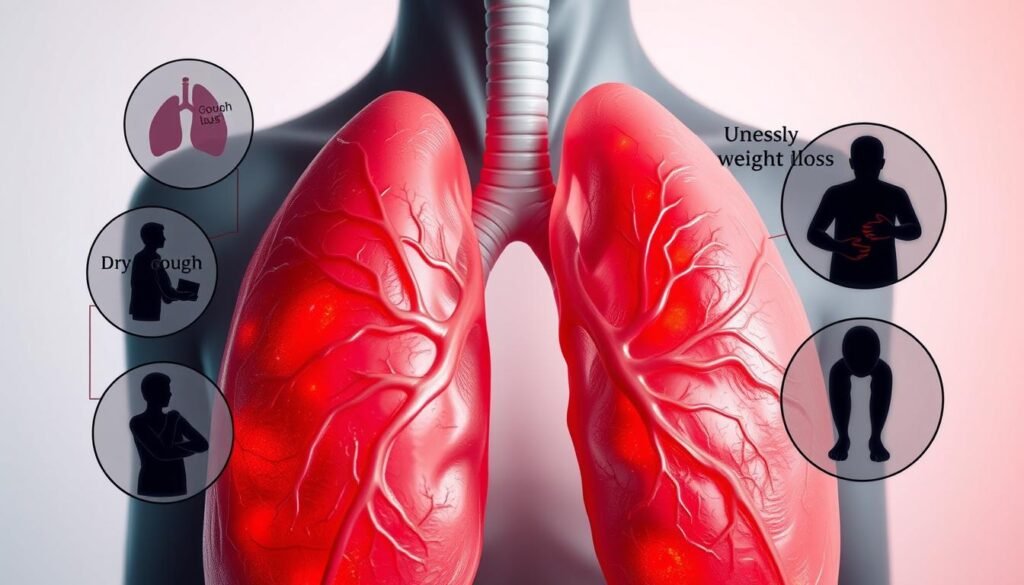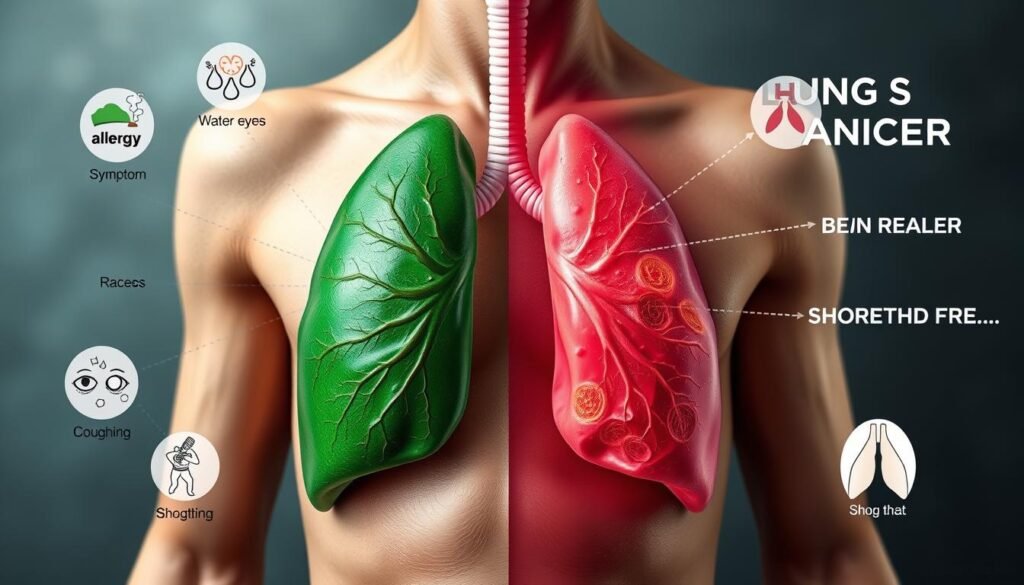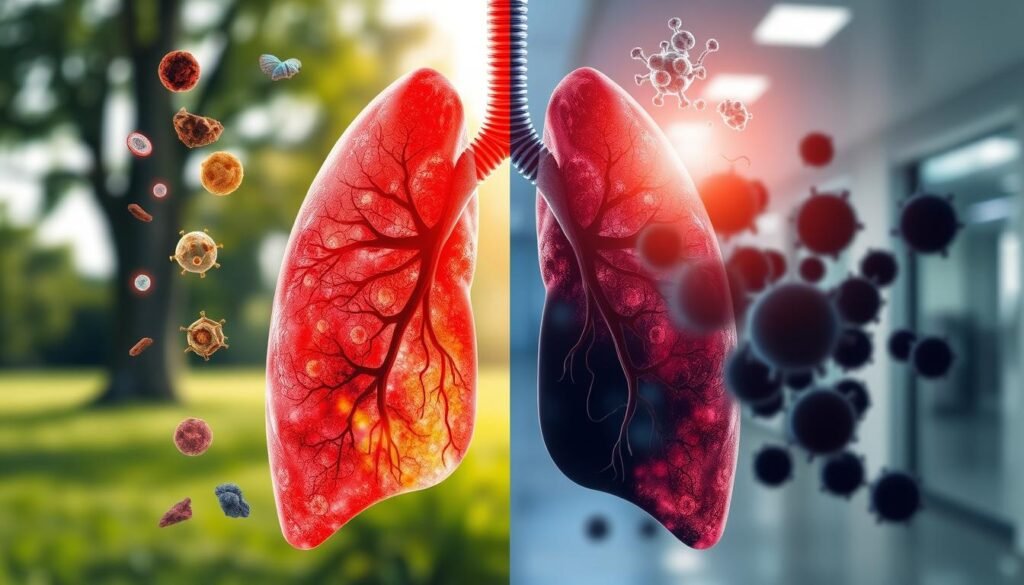Every year, more than 200,000 serious infections happen due to a fungus called Aspergillus. This mainly affects people with weaker immune systems. Such infections can show symptoms similar to allergies or even severe illnesses like lung cancer. With around 240,000 Americans diagnosed with lung cancer every year, it’s easy to mix up the signs of these two conditions. Knowing how to tell allergy symptoms from lung cancer signs is key to getting the right diagnosis and treatment early.
This article helps clear up the confusion between allergy and lung cancer symptoms. By looking into how these symptoms show up differently, you can better spot the differences. This is important for getting the right medical help. A wide range of body reactions, including changes in growth factors and immune responses, plays a big part in both allergies and cancer. To learn more, check out this comprehensive article.
Key Takeaways
- Allergies affect millions, while lung cancer represents a leading cause of cancer-related deaths.
- Understanding the overlap of symptoms can improve diagnosis and treatment outcomes.
- Inflammation is a common factor in both allergic reactions and cancer development.
- Proper identification of lung cancer symptoms can aid in differentiating from allergy symptoms.
- Misdiagnosis can lead to inadequate treatment and worsen patient anxiety and health outcomes.
- Being informed about chronic inflammation and its relation to cancer risks is crucial.
Understanding Allergies and Their Symptoms
Allergies are a common health issue for many people. They happen when your immune system wrongly sees a safe substance as dangerous. This triggers different symptoms. Knowing the types of allergies helps in managing them better.
Common Allergy Symptoms
People with allergies often have allergy symptoms like:
- Sneezing
- Runny or stuffy nose
- Itchy, watery eyes
- Fatigue
These symptoms can affect everyday life. People with chronic allergies deal with these symptoms all year round. They are often set off by things like pollen or mold. Spotting these symptoms early helps in getting the right treatment.
Chronic vs. Acute Allergies
Allergies are split into two types: chronic allergies and acute allergies. Chronic allergies last a long time and need regular treatment. Acute allergies happen suddenly and can cause severe reactions like trouble breathing. It’s important to know the difference so you can get help when needed. For more info on health, check out signs of lung cancer here.
Introduction to Lung Cancer Symptoms
Lung cancer symptoms usually start slowly, making it hard to catch early. Knowing the early signs can really help catch it sooner. It’s important to watch for any new symptoms. This can help find it early and treat it.
Early Signs of Lung Cancer
Spotting early signs of lung cancer can greatly help. Common warning signals include:
- Persistent cough that doesn’t go away
- Shortness of breath during daily activities
- Unexplained fatigue or weakness
- Unintentional weight loss
Advanced Symptoms of Lung Cancer
When lung cancer gets worse, the symptoms are more severe. These include:
- Chest pain that persists or worsens
- Recurring respiratory infections such as pneumonia
- Coughing up blood or rust-colored phlegm
- Swelling in the face or neck

Similar Symptoms Between Allergies and Lung Cancer
Both allergies and lung cancer can share symptoms, making it vital for people to know these similar symptoms. Respiratory problems make it even harder, needing skilled doctors to tell them apart. This is why being aware of what your body is telling you is crucial.
Respiratory Issues: Sneezing vs. Coughing
Allergies often cause sneezing and either a runny or blocked nose as your body fights allergens. On the other hand, lung cancer’s signs can include overtime coughing, sometimes with blood or mucus. These different respiratory issues need attention to avoid missing out on the right treatment.
The Role of Chest Discomfort
The issue of chest discomfort also adds to the diagnostic challenge. It could stem from allergies or hint at lung problems. Knowing when and how chest pain occurs, along with other signs, helps doctors find the best care route.

When Allergy Symptoms Mimic Lung Cancer Symptoms
It’s hard to tell apart allergy symptoms and lung cancer symptoms. Knowing the difference is key for diagnosis and treatment.
Differential Diagnosis: How to Distinguish Conditions
Doctors use detailed exams to figure out the real cause of symptoms. They mix:
- Allergy testing to find allergens
- Imaging like X-rays or CT scans for lung issues
- Checking past health issues, like asthma or COPD
Many patients share symptoms such as coughing or chest pain. A full check-up is crucial for the right diagnosis. Wrong diagnosis can lead to stress and treatment delays.
Patient Experience: Navigating Uncertainty
Patients can get really worried when symptoms could mean allergies or lung cancer. Telling their stories shows how hard it is to deal with this fear.
“After weeks of battling what I thought were allergy-related symptoms, the thought of lung cancer crossed my mind. The waiting period for tests felt unbearable,” shared one patient.
Talking clearly with doctors is key. Patients need to share their concerns and ask why certain tests are needed. Knowing how doctors figure things out can ease worry and help patients make wise health decisions.

| Symptom | Allergies | Lung Cancer |
|---|---|---|
| Cough | Common, often dry | Persistent, may include blood |
| Chest Pain | Rare, usually mild | Common, can be severe |
| Shortness of Breath | Associated with severe allergies | Frequent, especially when advanced |
| Wheezing | Common, reversible | May occur, less common |
| Weight Loss | No | Common, unexplained |
The Importance of Differential Diagnosis
Knowing the exact disease is key to treatment. Doctors need to know if a patient has allergies, lung cancer, or something else. It’s important to tell these diseases apart based on symptoms. This not only guides how to treat the patient but also affects their recovery.
Recognizing Key Differences
To avoid wrong diagnosis, it’s crucial to understand symptoms. Allergies can cause sneezing, itching, or rashes. On the other hand, lung cancer might start with a cough, lead to weight loss, or cause chest pain. Below is a table showing important differences:
| Symptom | Allergy | Lung Cancer |
|---|---|---|
| Cough | Common, usually dry | Persistent, may produce blood |
| Weight Loss | Uncommon | Common |
| Breathing Difficulties | Seasonal variations | Progressive over time |
| Skin Reactions | Common, itchy | Rare |
The Impact of Misdiagnosis
Getting the diagnosis wrong can lead to serious problems. For example, treating someone for allergies when they have lung cancer means lost time. That time is crucial for fighting a potentially deadly disease. This mistake can cause unnecessary medical treatments. It can also add financial and emotional stress. So, it’s very important for doctors to focus on finding the exact cause of symptoms, not just treating them.
Respiratory Conditions That Can Mimic Both Allergies and Cancer
Respiratory problems can feel like allergies or lung cancer. Asthma, chronic bronchitis, and chest infections have similar symptoms. It’s important to know the differences for the right diagnosis and treatment.
Common Respiratory Conditions to Consider
Asthma and other conditions can have allergic or cancer-like symptoms. For instance, asthma causes shortness of breath and coughing. Chronic obstructive pulmonary disease, from smoking, shows similar signs. Sinusitis and RSV also lead to these symptoms, especially in kids.
Doctors have to carefully check these symptoms to tell the conditions apart. They gather medical histories and look for unique signs. Tests like lung functions or chest X-rays help them decide.
Chest Infections vs. Allergic Reactions
Chest infections cause coughing, chest pain, and breathing issues. Sometimes these signs seem like lung cancer, especially with fever. Allergies can cause the same breathing problems, but also include sneezing and itchy eyes. Correctly identifying these is crucial to avoid the wrong treatment.
Doctors use tests and imaging to confirm the diagnosis. This makes sure patients get the right care for their specific problem. Learn more about diagnosing these conditions here.
Role of Immune Signals in Allergy and Cancer
The way immune signals work with our body’s defenses is key in allergies and cancer. Immune signals like DAMPs and PAMPs help recognize dangers. They play a big part in how allergies and cancer develop.
Understanding DAMPs and PAMPs
DAMPs come from cells that are hurt or dying. They tell us about tissue damage. PAMPs, on the other hand, come from germs. Our immune system sees these signals and reacts. This reaction can lead to long-term inflammation, which is linked to cancer. Knowing about these signals helps us understand allergies and cancer better.
Immune Response Mechanisms
The immune response is complex. It includes T cells, B cells, and innate immune cells. They all help recognize DAMPs and PAMPs. For example, high levels of serum IgE are linked to changed immune responses. Plus, research looks at how allergies and cancer are connected. They study ideas like chronic inflammation and how the body watches for cancer.
| Hypothesis | Description |
|---|---|
| Chronic Inflammation | Suggests atopic inflammation may heighten cancer risk. |
| Immunosurveillance | Indicates that high serum IgE could potentially decrease cancer risk. |
| Prophylaxis | Posits that allergic reactions may help expel toxic substances, thereby lowering cancer risk. |
| Th2 Immune Skewing | Suggests that atopy could lead to an imbalance promoting increased cancer risk. |
Studies keep looking into how these immune signals, allergies, and cancer are linked. From 2000 to 2020, over 500 studies have been reviewed. Understanding these links is still an important area for research.
The Connection Between Allergies and Cancer Risks
Studies have found a link between allergies and cancer risks. This suggests that long-term inflammation from allergies might help cancer grow. It’s really important for experts in both immunology and oncology to look into this. They need to explore ways to prevent and treat these risks.
Chronic Inflammation and Cancer Development
Allergies, especially from things we breathe in like plants and grass, can cause ongoing inflammation. This inflammation can raise the chances of getting certain blood cancers. A big study with over 66,000 people found those with allergies have a higher risk. So, reducing inflammation could help lower cancer risks.
Allergy History and Associated Risks
The same study showed women with allergies have a greater risk of blood cancers than men. This shows the need for more research on how allergies affect cancer risks differently. As we learn more about these links, it’s crucial for making better prevention methods. For more information, check out this study.